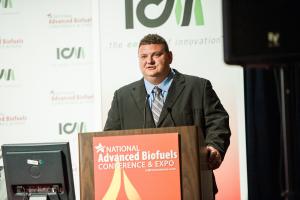
“Commercializing Industrial Biotechnology” is a workshop where top industrial biotech thought leaders will share their experiences and views on current challenges. The goal is to share knowledge that can help us all make advances in our work.
Jeremy Javers will be discussing the history behind dry-grind corn biorefining, the demands created through process intensification, as well as the opportunities dry-grind corn biorefining presents to the industry. He will deliver his speech at the Commercializing Industrial Biotechnology 2019 (CIB 2019) conference in May. I spoke with Jeremy about his work and ICM's vision for advancing the biorefining industry.
What specifically will you be talking about at the CIB conference?
Processing corn into ethanol through dry-grind biorefining provided a strategic entry for dramatic growth of value-added processing in agriculture. In less than a decade, the industry jumped from processing two billion bushels of corn per year to over seven billion bushels of corn annually. Investment in dry-grind corn ethanol resulted in reaching ethanol capacity and served as a launching pad for additional agricultural value creation. The industry has invested in separations over the past decade and continues to add value across the chain with distillers corn oil and advanced distillers feed products.
The complex process intensification within the dry-grind biorefining industry continues to demand a higher level of autonomy, mastery, and purpose from individuals in the industry. The addition of separations and new catalysts, both biological and inorganic, not only provide opportunities for people but also create opportunities for plants to significantly improve their bottom line through diversification. This presentation will examine ICM’s vision for dry grind corn biorefining, including its continued potential impact on the industry and the necessary steps to accomplish that vision.
My talk will:
- Discuss the historical impact of dry-grind biorefining on the biorefining industry
- Explore the demands for skill and mastery created by process intensification through various unit operations
- Discuss opportunities for cost-effective feedstocks from dry-grind biorefining and potential product applications
- Examine the opportunities dry-grind corn biorefining presents to individuals and plants within the industry
- Present ICM’s vision for dry-grind corn biorefining and next steps to reach that vision
What message would you like the audience to take away from your presentation and the conference?
I would like the audience to understand the steps required at a high level to achieve the vision of how dry-grind grain refining can support the bioeconomy. These steps include:
1. Technology development—stepwise process intensification
2. Ability to affect the food chain in a more intentional way
3. Improve implementations of technologies through people development
I'd also like the audience to have a picture in their mind of how the dry-grind sites can expand and what that looks like when we get there. A dry-grind looking more like a wet-mill.
How do you envision industrial biotechnology advancing some of the Grand Challenges in engineering and society (sustainability, health, etc.)?
In my opinion, there are two significant things happening currently in biotechnology. The speed at which we can generate biological/non-biological catalysts and the understanding of various microbiomes. Coupling the application of this knowledge with the above concepts and process development will help us to improve how we utilize and care for the resources and the world’s population moving forward.
The Commercializing Industrial Biotechnology 2019 (CIB 2019) conference will be held in Los Angeles from May 13-14, 2019. Learn more and register today.

Jeremy Javers
As ICM’s Director of Technology Development, Jeremy oversees development of technology from idea concept to lab, pilot, and commercial scale implementation. The ICM Technology Development team focuses on developing innovative ways to advance the biorefining industry and make biorefining increasingly more efficient. Jeremy has over 15 years of experience in the biorefining industry in both plant operations and research and development. He is the inventor of several ICM patents. Jeremy holds a B.S. in Chemistry from Dakota State University, as well as a Ph.D. in Microbiology from South Dakota State University.


